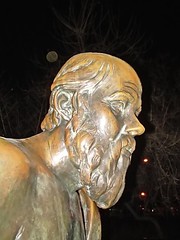Socrates, via Infoplease.com:
The Greek philosopher Socrates was born c. 470 B.C., in Athens and died in 399 B.C.
Socrates' Family:
We know little about the life of Socrates but we have the names of some of his family members from the works of Plato. Socrates' father was Sophroniscus (thought to have been a stonemason), his mother was Phaenarete, and his wife, Xanthippe. Socrates had three sons.
Death of Socrates:
Socrates was condemned to death for impiety by the Council of 500, for not believing in the gods of the city and for introducing new gods. He was offered an alternative to death, paying a fine, but refused it. Socrates took the cup of posion hemlock. His death was witnessed by friends.
Socrates as Citizen of Athens:
Socrates is remembered chiefly as a philosopher and the teacher of Plato, but he was also a citizen of Athens, and served the military as a hoplite at Potidaea (432-429), Delium (424) and Amphipolis (422) in the Peloponnesian Wars. He also participated in the Council of the 500.
Socrates is not known to have written anything and is best known from the dialogues of Plato, but before Plato he, was an object of ridicule as a sophist in Aristophanes' comedy The Clouds. Both Plato and Xenophon wrote about Socrates' defense at his trial in separate works called Apology.
Socrates and the Socratic Method:
Socrates is known for the Socratic method, Socratic irony and the pursuit of knowledge. Socrates is famous for saying that he knows nothing and that the unexamined life is not worth living.
From spaceandmotion.com we learn:
Socrates was a Greek (Athenian) philosopher. He never wrote down his thoughts, as such, the entirety of modern knowledge concerning Socrates must be drawn from secondary sources, such as the works of Plato, Aristophanes and Xenophon.
Socrates lived during the time of the transition from the height of the Athenian Empire to its decline after its defeat by Sparta and its allies in the Peloponnesian War. At a time when Athens was seeking to recover from humiliating defeat, the Athenian public court was induced by three leading public figures to try Socrates for impiety and for corrupting the youth of Athens. He was found guilty as charged, and sentenced to death. Instead of fleeing Athens (as his friends suggested), he chose to abide by the laws of his society and drank hemlock to end his life.
According to the version of his defense speech presented in Plato's Apology, Socrates' life as the ‘gadfly’ of Athens began when his friend Chaerephon asked the oracle at Delphi if anyone was wiser than Socrates; the Oracle responded negatively. Socrates, interpreting this as a riddle, set out to find men who were wiser than him. He questioned the men of Athens about their knowledge of good, beauty, and virtue. Finding that they knew nothing and yet believing themselves to know much, Socrates came to the conclusion that he was wise only in so far as he knew he knew nothing. The others only falsely thought they had knowledge. ... (see book for more)
Tuesday, March 13, 2007
Subscribe to:
Post Comments (Atom)


No comments:
Post a Comment